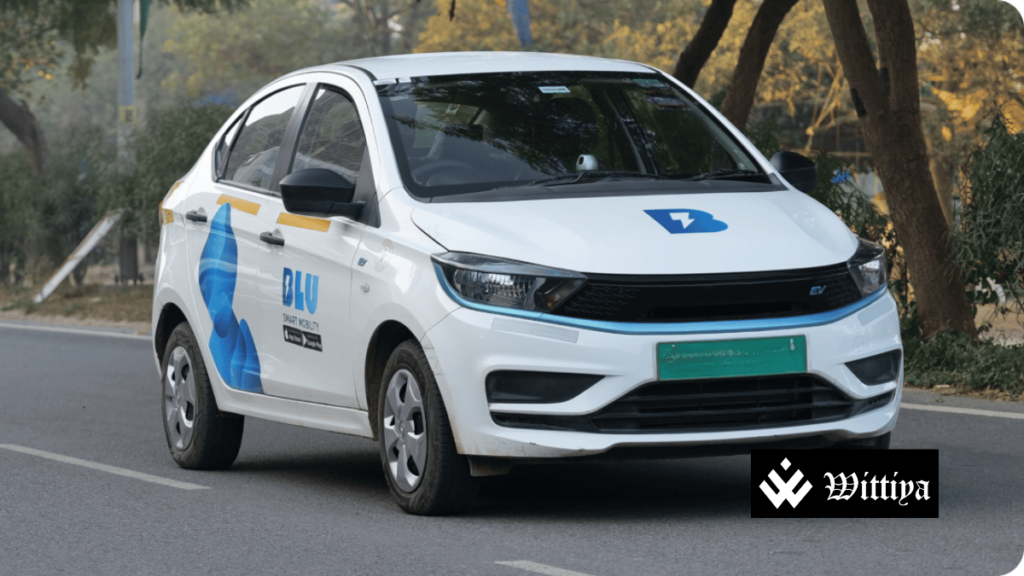BluSmart, one of India’s earliest EV ride-hailing startups, is actively seeking a buyer as it struggles with its asset-heavy model. Industry sources suggest Uber may be in early talks for an acquisition through Everest Fleet. The situation highlights challenges in India’s sustainable mobility sector.
BluSmart, one of India’s pioneering electric vehicle (EV) ride-hailing startups, is actively searching for a buyer amid growing financial strain. Industry sources indicate that Uber may be evaluating an acquisition through its vendor, Everest Fleet, though talks remain in the early stages. The development signals a critical moment for India’s electric mobility sector.
BluSmart’s EV Vision and Financial Struggles
Founded in 2019, BluSmart set out to revolutionize urban mobility by introducing India’s first all-electric ride-hailing fleet. Unlike Ola and Uber, which rely on driver-owned vehicles, BluSmart operates its own EV fleet and charging stations, ensuring service quality and sustainability. However, this asset-heavy model has proven financially challenging, limiting its expansion and increasing its reliance on external funding.
Reports indicate that BluSmart is struggling to maintain its financial viability, prompting it to seek strategic partnerships or a potential acquisition. While Uber has yet to make a formal bid, sources suggest Everest Fleet, a major operator on Uber’s platform, could facilitate the deal.
“This is still in very early stages. Uber is assessing whether acquiring BluSmart aligns with its long-term EV strategy, but the financial constraints make it a complex decision,” an industry insider said.
On March 16, BluSmart denied reports of ongoing acquisition discussions, stating that it remains committed to expanding its EV footprint across India.
Uber’s Growing EV Strategy in India
Uber has been aggressively expanding its EV fleet in India, forming strategic partnerships with EV manufacturers and fleet operators. The company recently announced plans to deploy 25,000 electric cars over the next two years, collaborating with partners like Lithium Urban Technologies, Everest Fleet, and Moove. It has also partnered with Zypp Electric to introduce 10,000 electric two-wheelers in Delhi by 2024.
Acquiring BluSmart could accelerate Uber’s EV push in India, giving it immediate access to a fully electric fleet and charging infrastructure. However, concerns over BluSmart’s financial liabilities may slow down negotiations.
The Gensol Connection and Financial Risks
BluSmart’s future is closely tied to Gensol Engineering, a renewable energy firm that provides the majority of its leased electric vehicles. Co-founded by Anmol Singh Jaggi, who also leads Gensol, BluSmart benefits from this relationship but also shares financial risks.
Gensol has faced significant financial setbacks, with its stock plunging 68% in early 2025 due to debt-related issues and an increase in share pledges. This has raised concerns about Gensol’s ability to continue supporting BluSmart’s operations, making an acquisition even more urgent for the ride-hailing startup.
Challenges in India’s EV Ride-Hailing Market
Despite its early success, BluSmart has struggled to scale beyond its strongholds in Delhi-NCR and Bengaluru. High infrastructure costs, delays in EV deliveries, and a lack of widespread charging stations have hindered its national expansion. While the company has raised over $200 million in funding from investors like BP Ventures and Mayfield Fund, it continues to burn cash rapidly.
Other ride-hailing competitors, such as Ola and Uber, operate on asset-light models, allowing them to scale more efficiently without heavy capital investment. Meanwhile, emerging players like Rapido and Namma Yatri are also disrupting the market with different approaches.
What Lies Ahead for BluSmart?
As BluSmart searches for a buyer, its future remains uncertain. A successful acquisition by Uber or another strategic investor could solidify its position as a leader in India’s EV ride-hailing sector. However, if no deal materializes, the company may face difficulties sustaining operations.
“The key question is whether an asset-heavy EV ride-hailing model can survive in India’s price-sensitive market,” said a market analyst. “If BluSmart can secure a strong financial partner, it could lead the sustainable mobility wave. If not, consolidation or an exit may be inevitable.”
As India continues its transition to green mobility, BluSmart’s journey will be a key indicator of whether EV ride-hailing can thrive in the country’s rapidly evolving transport sector.
